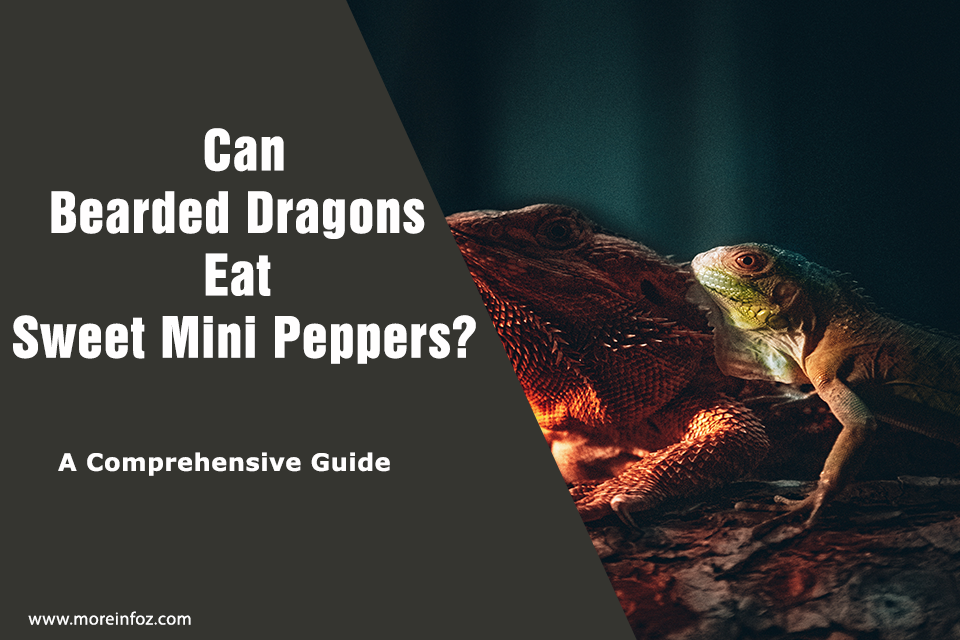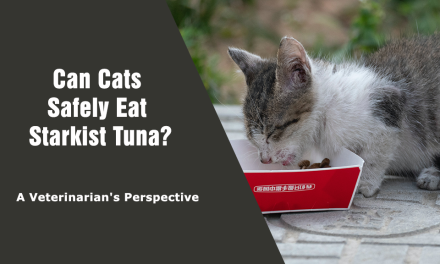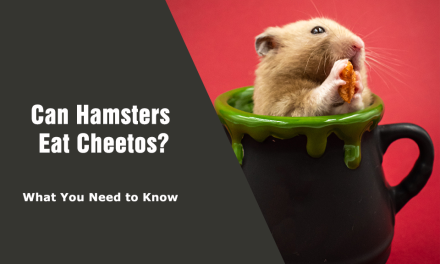Bearded dragons are popular pets due to their unique appearance and docile nature. As omnivores, they require a balanced diet of both animal and plant-based foods. While many owners are aware of the importance of feeding their bearded dragons insects and leafy greens, they may be curious about incorporating other types of vegetables into their diet. One such vegetable is sweet mini peppers.
Sweet mini peppers are small, colorful vegetables that are often used as a snack or in salads. They are a good source of vitamin C and contain other beneficial nutrients such as vitamin A and potassium. As bearded dragons require a varied diet, many owners may wonder if sweet mini peppers are a suitable addition to their pet’s meals.
In this article, we will explore whether bearded dragons can eat sweet mini peppers. We will examine the nutritional content of sweet mini peppers and how they may benefit or harm a bearded dragon’s health. Additionally, we will provide guidelines for incorporating sweet mini peppers into a bearded dragon’s diet safely and effectively.
Understanding Bearded Dragons Diet
Bearded dragons are omnivores, which means they eat both plant and animal matter. In the wild, they feed on insects, small rodents, fruits, and vegetables. As pets, they require a balanced diet to ensure they receive all the necessary nutrients to maintain good health.
It’s important to note that bearded dragons have different dietary requirements at different stages of their lives. Juvenile bearded dragons require more protein and calcium than adult bearded dragons. Adult bearded dragons, on the other hand, require more vegetables and fruits in their diet.
When it comes to feeding bearded dragons, it’s essential to provide them with a variety of foods. A varied diet ensures that they get all the essential nutrients they need. Feeding them the same food every day can lead to nutrient deficiencies and other health problems.
It’s also crucial to avoid feeding bearded dragons foods that are toxic to them. Foods like avocado, rhubarb, and chocolate can be fatal to bearded dragons. Additionally, foods high in oxalates, like spinach and kale, should be fed in moderation to prevent the formation of kidney stones.
In conclusion, understanding the dietary requirements of bearded dragons is crucial to their health and well-being. Providing a varied diet that includes both plant and animal matter, avoiding toxic foods, and adjusting the diet based on the age of the bearded dragon are all essential factors to consider when feeding these beloved pets.
Can Bearded Dragons Eat Sweet Mini Peppers?
We have received a lot of questions about whether bearded dragons can eat sweet mini peppers. After conducting thorough research, we have found that sweet mini peppers are safe for bearded dragons to eat in moderation.
Sweet mini peppers are a great source of vitamins and minerals for bearded dragons. They are low in fat and high in fiber, making them a healthy addition to their diet. However, it is important to note that sweet mini peppers should not be the main source of nutrition for bearded dragons.
When feeding sweet mini peppers to your bearded dragon, it is important to make sure they are washed thoroughly and cut into small pieces. Bearded dragons have small mouths and can choke on large pieces of food.
It is also important to note that sweet mini peppers should be given to bearded dragons as an occasional treat and not as a main meal. A balanced diet for a bearded dragon should consist of insects, vegetables, and fruits.
In conclusion, sweet mini peppers are safe for bearded dragons to eat in moderation. They are a great source of vitamins and minerals but should not be the main source of nutrition. When feeding sweet mini peppers to your bearded dragon, make sure they are washed, cut into small pieces, and given as an occasional treat.
Health Benefits of Sweet Mini Peppers
Sweet mini peppers are not only a tasty snack but also a healthy addition to your bearded dragon’s diet. Here are some of the health benefits of feeding sweet mini peppers to your pet:
- Vitamin C: Sweet mini peppers are an excellent source of vitamin C, which is essential for the growth and repair of tissues in the body. It also helps boost the immune system and aids in the absorption of iron.
- Vitamin A: Sweet mini peppers are rich in vitamin A, which is important for maintaining healthy skin, vision, and immune function.
- Fiber: Sweet mini peppers are a good source of fiber, which helps regulate digestion and prevent constipation.
- Low in Fat: Sweet mini peppers are low in fat, making them a great snack option for bearded dragons who are prone to obesity.
- Antioxidants: Sweet mini peppers contain antioxidants, which help protect the body against damage from free radicals.
It’s important to note that while sweet mini peppers are a healthy addition to your bearded dragon’s diet, they should not be the only food they consume. A balanced diet consisting of a variety of fruits, vegetables, and insects is essential for their overall health and wellbeing.
Potential Risks of Feeding Sweet Mini Peppers to Bearded Dragons
When it comes to feeding our bearded dragons, we want to ensure that we are providing them with a balanced diet that meets all of their nutritional needs. While sweet mini peppers can be a tasty treat for our pets, there are some potential risks that we should be aware of.
Digestive Issues
One potential risk of feeding sweet mini peppers to bearded dragons is the possibility of digestive issues. These peppers contain a high amount of fiber, which can be difficult for bearded dragons to digest. If they consume too much fiber, it can lead to bloating, constipation, and other digestive problems.
To avoid these issues, it is important to only feed sweet mini peppers in moderation. We should also ensure that our bearded dragons are getting enough water to help aid in digestion.
Nutritional Imbalance
Another potential risk of feeding sweet mini peppers to bearded dragons is the possibility of a nutritional imbalance. While these peppers do contain some beneficial nutrients such as vitamin C, they are not a complete source of nutrition for our pets.
Feeding too many sweet mini peppers can lead to a diet that is too high in certain nutrients and lacking in others. This can lead to health problems such as metabolic bone disease and other nutritional deficiencies.
To avoid these issues, we should ensure that sweet mini peppers are only a small part of our bearded dragon’s diet. We should also ensure that they are getting a variety of other foods that provide a complete source of nutrition.
In conclusion, while sweet mini peppers can be a tasty treat for our bearded dragons, we should be aware of the potential risks. By feeding them in moderation and ensuring a balanced diet, we can help keep our pets healthy and happy.
How to Safely Feed Sweet Mini Peppers to Bearded Dragons
Preparation
Before feeding sweet mini peppers to your bearded dragon, it’s important to properly prepare them. First, wash the peppers thoroughly to remove any dirt or pesticides. Then, remove the stem and seeds from each pepper. You can chop the peppers into small pieces or leave them whole, depending on your bearded dragon’s preference.
It’s also a good idea to introduce new foods slowly to your bearded dragon’s diet. Start by offering a small piece of pepper and monitor their reaction. If they show any signs of discomfort or illness, stop feeding them peppers immediately.
Portion Control
While sweet mini peppers can be a healthy addition to a bearded dragon’s diet, it’s important to remember that they should only make up a small portion of their overall diet. Bearded dragons require a balanced diet of protein, vegetables, and fruits.
As a general rule, vegetables and fruits should make up no more than 20% of a bearded dragon’s diet. When feeding sweet mini peppers, offer them in moderation and alongside other healthy foods.
It’s also important to note that not all peppers are safe for bearded dragons to eat. Avoid feeding spicy peppers or peppers that have been treated with pesticides or other chemicals.
By following these guidelines for preparation and portion control, you can safely incorporate sweet mini peppers into your bearded dragon’s diet.
Alternatives to Sweet Mini Peppers for Bearded Dragons
While sweet mini peppers are a great source of nutrition for bearded dragons, there are many other fruits and vegetables that can be added to their diet. Here are some alternatives to sweet mini peppers that you can consider:
1. Collard Greens
Collard greens are an excellent source of calcium and vitamin A, which are essential for the health of bearded dragons. They are also low in oxalates, making them a great choice for regular feeding. You can chop the collard greens into small pieces and mix them with other vegetables to create a nutritious salad for your bearded dragon.
2. Butternut Squash
Butternut squash is another great source of vitamin A and is low in oxalates. It is also rich in fiber, which can help regulate your bearded dragon’s digestion. You can bake the butternut squash and cut it into small pieces to feed your bearded dragon.
3. Green Beans
Green beans are a good source of protein and fiber, making them a great addition to your bearded dragon’s diet. They are also low in oxalates and easy to digest. You can steam the green beans and cut them into small pieces to feed your bearded dragon.
4. Blueberries
Blueberries are a great source of antioxidants and vitamin C, which can help boost your bearded dragon’s immune system. They are also low in oxalates and sugar. You can mix the blueberries with other fruits to create a nutritious fruit salad for your bearded dragon.
Overall, there are many fruits and vegetables that can be added to your bearded dragon’s diet. It’s important to provide a variety of foods to ensure that your bearded dragon is getting all the necessary nutrients for optimal health.
Frequently Asked Questions

What vegetables can bearded dragons eat every day?
Bearded dragons can eat a variety of vegetables every day, including collard greens, mustard greens, turnip greens, beet greens, dandelion greens, endive, escarole, kale, and bok choy. It’s important to provide a variety of greens to ensure your bearded dragon receives all the necessary nutrients.
What fruit can bearded dragons safely consume?
Bearded dragons can safely consume a variety of fruits, including apples, pears, strawberries, raspberries, blackberries, blueberries, mangoes, papayas, and figs. However, fruits should only be given as an occasional treat due to their high sugar content.
Can bearded dragons eat bell peppers on a regular basis?
Bearded dragons can eat bell peppers on a regular basis, but they should be given in moderation. Bell peppers are high in vitamin C and other nutrients, but they also contain a high amount of water, which can cause diarrhea if given in excess.
Is it safe for bearded dragons to eat cucumbers?
Bearded dragons can eat cucumbers, but they should only be given as an occasional treat. Cucumbers are low in nutrients and high in water, which can cause diarrhea if given in excess.
Are red peppers safe for bearded dragons to eat?
Red peppers are safe for bearded dragons to eat, but they should only be given in moderation. Red peppers are high in vitamin C and other nutrients, but they also contain a high amount of water, which can cause diarrhea if given in excess.
Can bearded dragons safely consume carrots and other vegetables?
Bearded dragons can safely consume carrots and other vegetables, but they should be given in moderation. Carrots are high in vitamin A and other nutrients, but they also contain a high amount of sugar, which can cause health problems if given in excess. It’s important to provide a variety of vegetables to ensure your bearded dragon receives all the necessary nutrients.





